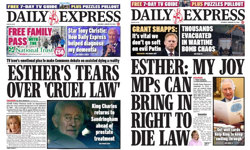Walker v Farmers Weekly
Complaint
Ms Jude Walker complained to the Press Complaints Commission that the newspaper had breached Clause 1 (Accuracy) and Clause 10 (Clandestine devices and subterfuge) of the Editors’ Code of Practice. The newspaper had published a photograph of badgers in close proximity to cattle, in daylight, and the complainant considered this to be highly unusual behaviour for badgers. She said that it misleadingly suggested that there is frequent interaction between cattle and badgers.
Resolution
The complaint was resolved when the PCC negotiated the publication of the following clarification both in print and on the newspaper’s website:
“Farmers Weekly would like to clarify that this photograph showing badgers in a field in daylight with cattle was taken in a captive environment, at the Secret World Wildlife Centre, Highbridge, Somerset in 1989 and not on a farm.
The picture was purchased from a south west picture agency several years ago and used in innocence to illustrate coverage about Bovine TB.
It was never our intention to mislead readers.
This clarification follows a complaint made to the Press Complaints Commission.” (Cl 1, Cl 10).
Moses v Daily Mail
Complaint
Ms Sharon Moses complained to the Press Complaints Commission that the newspaper has published inaccurate information in breach of Clause 1 (Accuracy) of the Editors’ Code of Practice. The complainant said that the newspaper had incorrectly claimed that she and her husband had faced charges of “human trafficking”. In fact, they had been involved in a civil case regarding the payment of fees.
Resolution
The complaint was resolved when the PCC negotiated the following apology:
Our article of 11 December “British couple charged with human trafficking and keeping their au pair as a ‘slave’ in France” incorrectly stated that Robert and Sharon Moses had been ‘charged with human trafficking’. We are happy to make clear that the couple did not face any criminal charges. The hearing was part of a civil case brought by the au pair seeking damages and compensation for inadequate payment; the claim was later rejected. We apologise to Mr and Mrs Moses for the error. (Cl 1)
Rust v Fabulous Magazine
Complaint
Ms Joanna Rust complained to the Press Complaints Commission that the newspaper had published incorrect information in breach of Clause 1 (Accuracy) of the Editors’ Code of Practice. The complainant said that in an advice column, the magazine had printed inaccurate advice regarding mileage allowance.
Resolution
The complaint was resolved when the PCC negotiated the publication of the following correction and apology on a subsequent advice page:
In an advice column of 4th May, Money Expert Sarah Pennells, informed a reader that as a zero-hours contract care worker who does not pay tax, her employees are not obliged to pay her travel costs while visiting patients. This information is not correct. While the care worker cannot claim tax relief on her mileage allowance, her employers should pay her mileage for work related travel. We apologise for the error. For more information visit: http://www.acas.org.uk/index.aspx?articleid=4468. (Cl 1)
Atkinson v The Sun
Complaint
Mr Roy Atkinson complained to the Press Complaints Commission about a report of the death of his wife, which he considered had intruded into his grief in breach of Clause 5 (Intrusion into grief or shock) of the Editors’ Code of Practice.
Resolution
The complaint was resolved after the PCC negotiated a private letter of apology from the newspaper and a donation to charity in memory of the complainant’s wife. (Cl 5)
Atkinson v Daily Mail (Mail Online)
Complaint
Mr Roy Atkinson complained to the Press Complaints Commission about a report of the death of his wife, which he considered had intruded into his grief in breach of Clause 5 (Intrusion into grief or shock) of the Editors’ Code of Practice.
Resolution
The complaint was resolved after the PCC negotiated the publication of the following apology, and a donation to charity in memory of the complainant’s wife:
We have been informed that an article about Rita Atkinson’s death published on 2nd January greatly upset Mrs Atkinson’s husband and family. We regret that this was the case and apologise for the distress caused. (Cl 5)
Negus v Daily Mail (Mail Online)
Complaint
Mr Chris Negus complained to the Press Complaints Commission, under Clause 1 (Accuracy) and Clause 3 (Privacy) of the Editors’ Code of Practice, about an article which reported on a property owned by his family, and which included photographs of that property taken without his consent.
Resolution
The complaint was resolved after the PCC negotiated a private letter of apology for the complainant, and amendments to the online articles. (Cl 1, 3)
Strong v The Sunday Times
Complaint
Mrs Loretta Strong of Arun Estate Agencies Limited – the parent company of Douglas Allen estate agency - complained to the Press Complaints Commission about an article which she considered to have been inaccurate and misleading in breach of Clause 1 (Accuracy) of the Editors’ Code of Practice. The complaint believed that the article misrepresented Arun Estate’s business practices.
Resolution
The complaint was resolved when the PCC negotiated the publication of the following clarification:
“A report about the property market (Welcome to the jungle, Home, March 9) stated that Douglas Allen estate agency advocates selling by “informal tender”, charges the purchaser a percentage fee based on the property’s value and also “picks up the usual fee” from the seller. In fact, the agency only charges the seller a small administration fee of £150 plus Vat. We also accept that sale by tender is a legitimate marketing method. We are happy to clarify the position and apologise for the error and any embarrassment caused”. (Cl 1)
Portes v Daily Mail
Complaint
Mr Jonathan Portes, Director of the National Institute of Economic and Social Research, complained to the Press Complaints Commission that the newspaper had published inaccurate and misleading information in breach of Clause 1 (Accuracy) of the Editors’ Code of Practice. The complainant said that the following statement was incorrect: “Hundreds of thousands of East European migrants are making little or no contribution to the Exchequer despite working full-time, a report claims today”. Subsequent claims that 150,000 Eastern European migrants without partners or children and who earned the minimum wage paid around £1 a week in net tax were incorrect. The report said a single person on the minimum wage would pay around £1 per week in net tax. It did not, however, state how many of the 150,000 single Eastern European migrants earned the minimum wage. The statement was therefore inaccurate. Furthermore, the references to “net tax” and “contribution to the Exchequer” were misleading; it did not take into account indirect taxes, including VAT.
Resolution
The complaint was resolved when the newspaper amended the online article to make clear that “thousands”, rather than 150,000, migrants paid £1 in income tax, and published the following footnote:
An earlier version of this article reported claims from Migration Watch that 150,000 Eastern European migrants with no partners or children who are earning the minimum wage paid just £1 a week in net tax, including National Insurance. In fact, other statistics in the report show that, of this number, childless couples will in fact pay more. All of the workers contribute to the Exchequer through VAT and other indirect taxes. We have now amended the article accordingly. (Cl 1)
A woman v Daily Mirror
Complaint
A woman complained to the Press Complaints Commission that the newspaper had published inaccurate information in breach of Clause 1 (Accuracy) of the Editors’ Code of Practice. The complainant, who had been a victim of sexual abuse by Max Clifford, said that the newspaper had incorrectly stated that she had admitted in court that “the sexual relationship with the older, charismatic man was consensual”. The complainant had not had a “sexual relationship” with him; she had been sexually abused by him. Furthermore, she had not admitted he was charismatic or that the abuse was consensual; it could not, in any case, have been consensual, as she had been a child. The complainant was further concerned that another article had incorrectly implied that she had given the newspaper an interview, and inaccurately attributed a comment to her.
Resolution
The complaint was resolved when the PCC negotiated the removal of the disputed sentences from the online articles, and the newspaper published the follow apology:
Further to our articles of 29 April and 30 April concerning a victim of Max Clifford we have been asked to point out that she denies calling him a “disgusting pervert”.
Contrary to the claim that her sexual relationship with him was consensual, the victim did not consent and further, could not consent because of her age. We apologise for any distress caused. (Cl 1)
Harris v Yorkshire Evening Post
Complaint
Ms Vivien Harris complained to the Press Complaints Commission under the terms of Clauses 1 (Accuracy) and 9 (Reporting of crime) of the Editors’ Code of Practice. The complainant said that the newspaper had inaccurately claimed that a criminal offence took place at her home address.
Resolution
The complaint was resolved when the PCC negotiated a letter of apology from the newspaper for the error. (Cl 1, 9)
Davis v Kent Messenger
Complaint
Mr Philip Davis complained to the Press Complaints Commission about a report of his son’s court appearance, in which he said that the number of charges to which his son had pleaded guilty was inaccurately reported in breach of Clause 1 (Accuracy) of the Editors’ Code.
Resolution
The complaint was resolved after the PCC negotiated a private letter of apology and acknowledgement from the newspaper. (Cl 1)
Muldoon v Edinburgh Evening News
Complaint
Miss Katie Muldoon complained to the Press Complaints Commission that the newspaper had intruded into her family’s grief by publishing an article following the death of her father, Pat Muldoon, in breach of Clause 5 (Intrusion into grief and shock) of the Editors’ Code of Practice. The complainant considered the emphasis placed on her father’s brief imprisonment in 1993 in the tribute to him was insensitive. The newspaper had not sought the family’s consent prior to publication, and had included details of the private family funeral in the piece.
Resolution
The complaint was resolved when the newspaper wrote a letter of apology to the family for the distress caused by the article. (Cl 5)
A woman v The Sun
Complaint
A woman complained to the Press Complaints Commission, on behalf of her mother, that a number of articles had breached Clause 1 (Accuracy), Clause 3 (Privacy), Clause 5 (Intrusion into grief or shock), Clause 6 (Children) and Clause 9 (Reporting of Crime) of the Editors’ Code of Practice. The complainant was concerned that the newspapers had published articles about her brother which made unnecessary and distressing references to their mother, intruding into her private life.
Resolution
The complaint was resolved after the PCC negotiated the removal of the articles from the newspaper’s website. (Cl 1, 3, 5, 6 & 9)
A woman v Daily Mail
Complaint
A woman complained to the Press Complaints Commission, on behalf of her mother, that a number of articles had breached Clause 1 (Accuracy), Clause 3 (Privacy), Clause 5 (Intrusion into grief or shock), Clause 6 (Children) and Clause 9 (Reporting of Crime) of the Editors’ Code of Practice. The complainant was concerned that the newspapers had published articles about her brother which made unnecessary and distressing references to their mother, intruding into her private life.
Resolution
The complaint was resolved after the PCC negotiated the removal of the articles from the newspaper’s website. (Cl 1, 3, 5, 6 & 9)
A woman v Daily Mirror
Complaint
A woman complained to the Press Complaints Commission, on behalf of her mother, that a number of articles had breached Clause 1 (Accuracy), Clause 3 (Privacy), Clause 5 (Intrusion into grief or shock), Clause 6 (Children) and Clause 9 (Reporting of Crime) of the Editors’ Code of Practice. The complainant was concerned that the newspapers had published articles about her brother which made unnecessary and distressing references to their mother, intruding into her private life.
Resolution
The complaint was resolved after the PCC negotiated the removal of the articles from the newspaper’s website. (Cl 1, 3, 5, 6, & 9)










